
Press Center
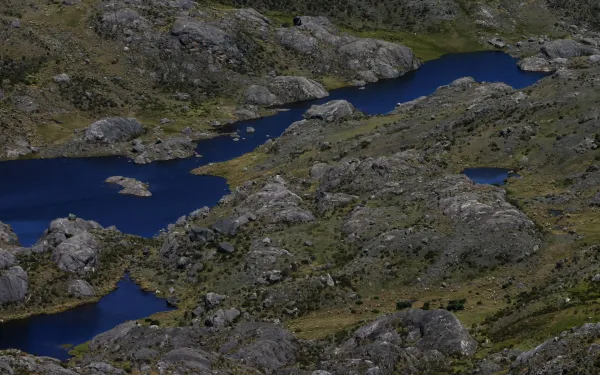
Ombudsman finds the IFC failed to comply with its investment standards in Colombia
The office of the Compliance Advisor Ombudsman found that the International Finance Corporation cannot guarantee that the Angostura mine will not have impacts on the environment. Washington/Ottawa/Bogotá/Ámsterdam. The office of the Compliance Advisor Ombudsman (CAO) has issued its final report on the complaint brought against the International Finance Corporation's (IFC) investment in Eco Oro Minerals’ Angostura mine in the high-altitude wetlands – known as páramos – of Santurbán, Colombia. The office warned that the corporation has not met all the standards required of its investments, including an assessment of potential impacts on biodiversity. The investigation was triggered by a complaint filed by the Comité por la Defensa del Agua y el Páramo de Santurbán (Committee for the Defense of Water and the Paramo de Santurban), with the support of the Center for International Environmental Law (CIEL), the Center for Research on Multinational Corporations (SOMO), the Interamerican Association for Environmental Defense (AIDA) and MiningWatch Canada. "The biodiversity of Santurbán is critical to ensuring our water supply. Therefore, any threat to its biodiversity affects the water resources of the entire metropolitan area of Bucaramanga," said Alix Mancilla, of the Santurbán Committee. The report also states that the IFC failed to assess the impacts of the entire mining project, and instead only concentrated on the impacts of the exploration stage, despite the fact that it justifies its investment on the basis of the supposed benefits that the eventual mine would bring. The CAO found that the "potential to comply with IFC’s environmental and social standards was uncertain and potentially challenging" during the extraction phase. In its conclusion, the Ombudsman points out that "one of the stated purposes of the IFC's investment was to develop the studies necessary to determine whether the project could comply with IFC's [performance standards]. " However, the company did not complete the required studies, including an Environmental and Social Impact Assessment, a biodiversity baseline study, and critical habitat assessments. Despite repeated lack of compliance by the client, the CAO found that the "IFC has not pursued a remedy, but has made subsequent investments in the company." "If the purpose of IFC's investment was to determine the viability of the project, there is no justification for the lack of studies – studies that are required to make an investment decision. You cannot greenlight a project in such a critical region for the population of Bucaramanga without assessing its actual consequences," declared Carla Garcia Zendejas of CIEL. The IFC's response to the Ombudsman’s report did not acknowledge any wrongdoing or make commitments to address its findings. Instead, the IFC merely reiterated its justification for investing in the project, claiming that the eventual mine will bring employment and revenue. The response is silent regarding its client's intent to file an investment dispute under the Canada-Colombia Free Trade Agreement. "It is very serious that despite failures in the risk assessment, the IFC has continued to invest in the Angostura mining project," added Kris Genovese, from SOMO. “It is disappointing, but not surprising, that the IFC has failed once again to respond to the findings of a CAO investigation.” AIDA attorney Carlos Lozano Acosta explained that “the project is illegal; that’s why its license was denied in 2011, and why the Constitutional Court ratified the prohibition of mining in páramos. It worries us that the IFC invested in a company whose project, from the beginning, was not viable, and who would file an international lawsuit against Colombia, one of the member states of the World Bank.” The report reveals that the IFC has an explicit policy of investing in junior mining companies with limited capacity to manage environmental and social issues, in countries where the regulatory framework is weak or not enforced. "It is time for the IFC to withdraw its investment in Eco Oro and stop investing in junior mining companies, as has been done in Colombia and elsewhere, knowing the serious social and environmental damage this entails and the context of impunity in which these companies are operating," stated Jen Moore of MiningWatch. "As communities affected by the mine, we will continue challenging the project in court, and we will use all legal means at our disposal to stop it, as we have done so far," affirmed Elizabeth Martinez from the Committee for Santurban. Currently, Colombia's Constitutional Court is considering a legal action filed by the Santurbán Committee with support from AIDA, concerning the lack of citizen participation in the demarcation of the wetland. A decision is expected soon. The IFC is the private-sector lending arm of the World Bank Group. The CAO is an independent accountability mechanism that receives complaints from people who may be affected by IFC investment projects. The CAO’s report and communiqué, including the IFC’s response can be found here: Communiqué: http://www.cao-ombudsman.org/cases/document-links/documents/CAOCommuniqueEcoOroSummaryofFindingsAugust252016.pdf Report: http://www.cao-ombudsman.org/cases/document-links/documents/CAOComplianceInvestigationReportonIFCinvestmentinEcoOroMinerals-English.pdf Response by the IFC: http://www.cao-ombudsman.org/cases/document-links/documents/EcoOro-IFCManagementResponsetoCAOInvestigationReport-5August2016.pdf
Read more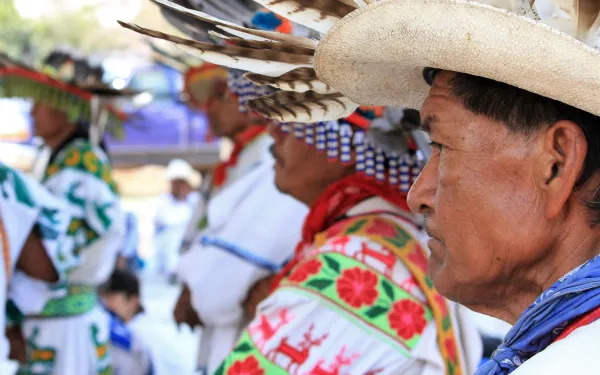
Civil society urges the United Nations to document human rights violations committed by businesses in Mexico
A group of organizations delivered their report highlighting more than 60 cases of violations across the country. Mining, infrastructure and energy projects—including hydroelectric and wind—were responsible for the greatest number of human rights violations. Mexico City, Mexico. On the occasion of the United Nations Working Group on Business and Human Rights’ official visit to Mexico, a coalition of more than 100 civil society organizations, movements and networks prepared a report outlining cases of human rights violations perpetrated by corporations in Mexico. The report highlights Mexico’s current human rights crisis, which has been recognized by various UN agencies[1] and the Inter-American Commission on Human Rights.[2] It lays out the clear dangers facing those who protect human rights, the land and their own territory.[3] Documented cases of human rights abuses involve 50 foreign, 41 national, and eight public companies. More than half the cases involved intimidation and/or attacks against human rights defenders. The most frequent violations were to the rights to: land and territory; access to information; health; a healthy environment; and consultation and free, prior and informed consent. During the Working Group’s regional visits, affected communities will show the experts the negative impacts caused by companies linked to mining, wind power, hydroelectric dams, agribusiness, infrastructure, oil and gas exploitation, real estate, tourism and maquilas (manufacturing facilities), among others. At the suggestion of civil society, the Working Group will meet with companies including: Grupo México, Grupo Higa, Grupo BAL, Bimbo, Goldcorp, TransCanada, Eólica del Sur, and CEMEX. They will also meet with the state-run production companies, Petróleos Mexicanos (Pemex) and the Federal Electricity Commission (CFE). Situations in Mexico that systematically hinder compliance with the UN Guiding Principles on Business and Human Rights include: State Capture: complicity, corruption and impunity. In many documented cases, the Mexican State, at all levels (federal, state and municipal), has served business interests above public interest. This has been evident in: the promotion of rules and regulations that benefit business interests over human rights; the use of public force against peaceful social mobilization; the support of extractive projects against community interests; the lack of inquiry and sanction by the judiciary regarding allegations of human rights abuses; and the criminalization of environmental advocates. Structural reforms that weaken the protection of human rights and support companies, such as the energy reform, which does not always consider its impacts on human rights, and does not guarantee the participation and right of access to information of affected communities. Lack of consultation and the free, prior, informed, culturally appropriate, and in good faith consent of affected communities; lack of due diligence on the part of companies; and the proliferation of megaprojects with severe impacts on human rights. Lack of access to justice and non-compliance with rules and judgments, by companies as well as the Mexican State. On multiple occasions, affected people who have reported rights violations have later been the victim of attacks. And, even if a court—including the Mexican Supreme Court— ruled in their favor, the fulfillment of that ruling was not observed. Reduction of participation mechanisms and an increase in abuses against human rights defenders. The cases illustrate an increase in murders, criminalization, threats and attacks on human rights defenders who have spoken out against mega-projects and business activities. In 2011, the United Nations Human Rights Council issued the "Guiding Principles on Business and Human Rights" in order to empower States to exercise control over business activities, ensure due diligence, and guarantee access to effective and appropriate remedial measures. In order to monitor the application of these principles, the Council established the Working Group on Business and Human Rights, whose visit Mexico from August 29th to September 7th 2016 will be their second visit to Latin America. On behalf of the organizations and communities that prepared this report, we hope that the conclusions reached by the Working Group at the close of their visit will reflect what Mexico truly needs. We urge companies operating in Mexico, as well as the Mexican State, to consider the recommendations seriously and implement them in current and future operations. For more information in social media, following along: #ONUenMX The report was created with the participation of the following organizations and human rights groups (in alphabetical order): Alianza de la Costa Verde Ambiente y Desarrollo Humano Asociación Interamericana para la Defensa del Ambiente (AIDA) Bios Iguana Campaña Nacional Sin Maíz No Hay País Cartocrítica Casa del Migrante Saltillo Centro de Derechos Humanos “Fray Bartolomé de Las Casas” Centro de Derechos Humanos “Fray Francisco de Vitoria” Centro de Derechos Humanos “Miguel Agustín Pro Juárez” (Centro Prodh) Centro de Derechos Humanos de la Montaña, Tlachinollan Centro de Derechos Humanos Toaltepeyolo Centro de Derechos Humanos Zeferino Ladrillero (CDHZL) Centro “Fray Julián Garcés” Derechos Humanos Centro de Información sobre Empresas y Derechos Humanos (CIEDH) Centro de Reflexión y Acción Laboral (CEREAL) Centro Diocesano para los Derechos Humanos “Fray Juan de Larios” Centro Mexicano de Derecho Ambiental (CEMDA) Colectivo sí a la vida No al basurero tóxico en Noria de la Sabina Comités de Cuenca Río Sonora (CCRS) Comité de Defensa Integral de Derechos Humanos Gobixha (CODIGODH) Comité de Derechos Humanos de Tabasco (CODEHUTAB) Comisión Mexicana para la Defensa y Promoción de los Derechos Humanos (CMDPDH) Consejo en Defensa de la Vida y el Territorio TiyatTlali DECA Equipo Pueblo DH Rayoactivo El Barzón Chihuahua EcoRed Feminista la Lechuza Buza Enfoque DH Estancia del Migrante en Querétaro Frente de Pueblos en Defensa de la Tierra y el Agua (FPDTA) Fundar, Centro de Análisis e Investigación Foro de Derechos Humanos y Resistencias de la Sierra de Puebla Greenpeace México Grupo de Estudios Ambientales Grupo Focal sobre Empresas y Derechos Humanos Indignación, Promoción y Defensa de los Derechos Humanos Instituto Mexicano para el Desarrollo Comunitario (IMDEC) Movimiento Ciudadano en Defensa de la Loma Movimiento Mexicano de Afectados por las Presas y en Defensa de los Ríos (MAPDER) Movimiento Mesoamericano contra el Modelo Extractivo Minero (M4) OrganicConsumersAssociation (México) Oxfam México Programa Universitario de Derechos Humanos, Programa de Incidencia, Programa de Medio Ambiente, UIA Proyecto de Derechos Económicos, Sociales y Culturales (ProDESC) Proyecto sobre Organización, Desarrollo, Educación e Investigación (PODER) Red Mexicana de Afectados por la Minería (REMA) Semillas de Vida SMR, Scalabrinianas: misión con Migrantes y Refugiados Serapaz, Servicios y Asesoría para la Paz Y la Red Nacional de Organismos Civiles de Derechos Humanos “Todos los Derechos para Todas y Todos” (conformada por 80 organizaciones en 21 estados de la República mexicana). The information was collected based on the baseline questionnaire for documenting abuses of companies prepared by the Business Information Center and Human Rights(CIEDH) and the network(DESC) https://goo.gl/YLhbSM [1] Declaration of the United Nations High Commissioner for Human Rights, ZeidRa’ad Al Hussein, done in his visit to Mexico in October 7, 2015: http://www.ohchr.org/en/NewsEvents/Pages/DisplayNews.aspx?NewsID=16578&LangID=E [2] Inter-American Commission on Human Rights. Human Rights situation in Mexico, (OAS.Official Documentation; OEA/Ser.L) ISBN I. Title. II. Series. OAS. Official Documentation; OEA/Ser.L. OEA/Ser.L/V/II.Doc. 44/15 p. 11 http://www.oas.org/es/cidh/informes/pdfs/Mexico2016-es.pdf [3] Institute for Economics & Peace, Global Peace Index 2015 Measuring peace, its causes and its economic value p. 8 http://economicsandpeace.org/wp-content/uploads/2015/06/Global-Peace-Index-Report-2015_0.pdf Mexico´s Rank 140 out of 163 http://www.visionofhumanity.org/#page/indexes/global-peace-index/2016/MEX/OVER
Read more
NGOs call on Mexico to protect Mayan beekeeping communities affected by cultivation of genetically modified soy
The lives, health, and integrity of indigenous people are threatened by deforestation and contamination of their land caused by the cultivation of genetically modified soy. The situation is worsening because the Mexican government has not adopted effective measures to safeguard the rights of the communities. Washington D.C., United States. Traditional Mayan beekeeping communities, alongside a coalition of national and international organizations, have denounced the cultivation of genetically modified soy in the Mexican states of Campeche and Yucatan as damaging to the lives, health, and integrity of Mayan people, and to the health of the environment on which they depend. On July 25, a coalition of organizations filed a complaint on behalf of Mayan communities with the Inter-American Commission on Human Rights (IACHR). The organizations are the Interamerican Association for Environmental Defense (AIDA); Centro Mexicano de Derecho Ambiental (CEMDA); Greenpeace Mexico; Indignación, Promoción y Defensa de los Derechos Humanos, A.C. (Indignación); and Litiga, Organización de Litigio Estratégico de Derechos Humanos A.C. (Litiga OLE). The health and way of life of affected people—especially children, pregnant women, and the elderly—are at increasing risk from deforestation and the use, during planting, of the toxic herbicide glyphosate, which has been proved to contaminate soil and water sources. The crops have been genetically modified to resist the herbicide, which leads growers to apply it in ever greater concentrations. The organizations asked the Commission to grant precautionary measures, an action that would urge the Mexican government to implement actions that protect the rights of communities and effectively halt the cultivation of genetically modified soy in Campeche and Yucatan. Leydy Pech, representative of the Mayan communities, said, “planting genetically modified soy in Mayan territory violates our rights and our culture, which has been passed down to us from our ancestors. Because of the cultivation of soy on our lands, we have lost medicinal plants, vital trees for local bee populations, and animals, and have even seen some of our archeological sites destroyed. This harms our Mayan identity and denies us the possibility of passing that knowledge on to our children; traditional knowledge that allows us to preserve the forest and generate wellbeing for our communities.” AIDA attorney María José Veramendi added, “the Mexican government has an obligation to apply the precautionary principle and take into account the health risks that come with glyphosate and the cultivation of genetically modified soy. By not doing so, the State is failing to comply with its duty to prevent violations of the rights of Mayan communities, who are exposed to the herbicide as it drifts on wind and contaminates water sources.” The affected Mayan communities live in the municipalities of Hopelchén, in the state of Campeche, and Mérida, Tekax and Teabo, in the state of Yucatan. Permits to cultivate genetically modified soy also affect other communities in the seven states of the Mexican Republic. The communities were not consulted, nor did they give their free, prior, and informed consent, before Mexico granted the permits necessary for the cultivation of genetically modified soy in their territory. Under international law, indigenous communities must be guaranteed the right to prior consultation and informed consent. What’s more, the planting has seriously affected traditional beekeeping practices, part of Mayan culture and one of the main sources of livelihood for the communities. In addition to requesting precautionary measures, the organizations filed a petition with the IACHR denouncing violations of the rights to land and communal property, to life and personal integrity, to a healthy environment, to work, and to judicial protection and access to justice. According to the organizations, the State has not taken effective measures to safeguard the rights of affected populations despite their efforts to seek justice in domestic courts. “Although the Mayan communities obtained a favorable ruling from the Second Chamber of the Supreme Court last November, the judgment did not resolve all the human rights violations,” explained Francisco Xavier Martínez Esponda, legal representative of CEMDA. “During the consultation process, authorities neither respect traditional manners of decision-making nor meet Inter-American standards for upholding this fundamental right. Since the Mexican State could not rule on all instances of rights violations or order their rectification, we have now brought the case before the Inter-American Commission on Human Rights.”
Read more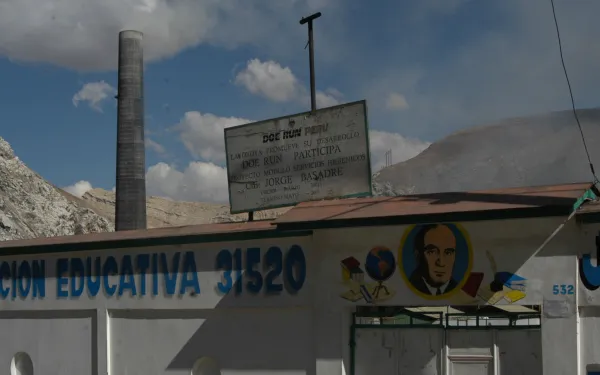
Statement from AIDA and APRODEH on the International Arbitration Ruling in La Oroya
The Peruvian government must adequately address the environmental, public health and employment situation in La Oroya. Lima, Peru. On Monday the International Center for the Settlement of Investment Disputes (ICSID) ruled in favor of the Peruvian government in a case involving the Metallurgical Complex of La Oroya. As organizations representing residents in La Oroya, the Interamerican Association for Environmental Defense (AIDA) and the Asociación Pro Derechos Humanos (APRODEH) welcome the decision, which terminates the legal proceedings against the State. The Renco Group, owner of Doe Run Peru, operator of the smelter in La Oroya, initiated arbitration after the Peruvian government claimed the company failed to comply with its environmental commitments. ICSID, a World Bank-sponsored institution, dismissed Renco’s claim due to lack of jurisdiction. While AIDA and APRODEH celebrate this positive news for the government of Peru, it is our hope that, as a result of this decision, the State concentrates its efforts on providing a sustainable solution to the vast contamination in La Oroya, and that it prioritizes the health, environment and employment situation of residents there. We also urge the government to fully comply with the precautionary measures the Inter-American Commission on Human Rights granted in 2007, and extended in 2016, in favor of a group of residents affected by the pollution. Peru also must accept its international responsibility for the human rights violations committed against the inhabitants of La Oroya in the case that is pending before the Commission. Regarding the decision, AIDA Co-Director Astrid Puentes said: “For years we have worked to dismiss the false premise that our demand for the safe and responsible operation of the Metallurgical Complex of La Oroya somehow violates the rights of workers. Doe Run Peru—or any company—can and must operate the smelter in a way that also protects and respects the basic human rights to life and health, for the workers as well as the entire population of La Oroya.”
Read more
AIDA condemns threats to environmental defenders in Tolima, Colombia
As a regional organization, we call on the Colombian government to immediately adopt measures to guarantee the life and integrity of at-risk activists. The Interamerican Association for Environmental Defense (AIDA) categorically condemns threats made against the Youth Socio-Environmental Collective of Cajamarca, Colombia (Cosajuca). On July 8, the organization—which forms part of the Environmental Committee of Cajamarca and the Network of Environmental Committees of Tolima—received a document containing death threats, only the most recent of a series of intimidations to which its members have been subject. The urgency of addressing this situation comes light of a larger problem in Colombia and across the region. In their most recent report, the international NGO Global Witness identified Colombia as the third most dangerous country in the world to be an environmental defender; 26 deaths were registered there in 2015. AIDA calls on the government of Colombia to guarantee the life, liberty and physical integrity of the members of Cosajuca. We also urge the establishment of a safe space for these environmental defenders to do their work, and a prompt investigation into the threats made against them. Freedom of expression and association are fundamental to the rule of law and a democratic society. Access to information, participation and the search for environmental justice are legitimate activities protected by the Constitution and the international legal treaties to which Colombia is a party. Cosajuca exercises those rights by promoting a popular referendum against mining contamination in the town of Cajamarca, and the department of Tolima, where large-scale gold mining operations are being planned. The harassment and murder of environmental defenders is pervasive throughout Latin America, which, according to the Global Witness report, is home to two-thirds of the world’s murdered activists and seven of the ten deadliest countries to be an environmental defender.
Read more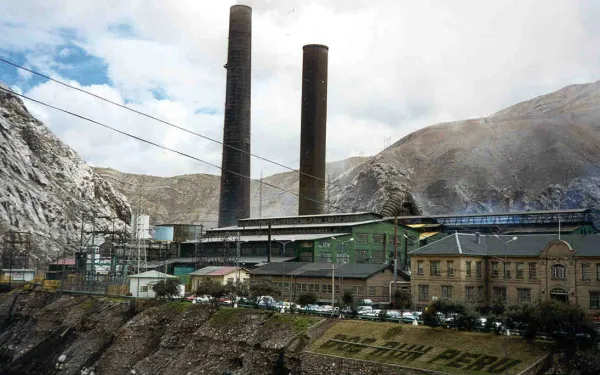
Peru must find a comprehensive and sustainable solution for La Oroya
We call on the President-elect of Peru to take into account, in any assessment of or decision about La Oroya, the rights of the population affected by the city’s severe pollution. La Oroya, Peru. On July 6, the President-elect of Peru, Pedro Pablo Kuczynski, visited the Metallurgical Complex of La Oroya (CMLO) and announced to its workers that it was necessary for the next Congress to approve a law to extend the deadline for liquidation of the Complex. This, he said, would give the company time to secure investors and finish the copper circuit. He also asked the workers and people of La Oroya to march on Congress to support his proposal. Reflecting on these public statements, the Asociación Pro Derechos Humanos (APRODEH) and the Interamerican Association for Environmental Defense would like to express the following: The city of La Oroya deserves the full attention of all levels and sectors of government to resolve in a comprehensive, specialized and sustainable way the demands of the population that, at various times in its history, has suffered, and continues to suffer, violations of their basic human rights, including the right to life, health, integrity, work and a healthy environment. Regarding the right to work, La Oroya requires a deep assessment that permits the State to propose and implement not only remedial actions, but also actions that will guarantee decent and lasting work that will sustain adequate living conditions for the entire population. No action can resolve the underlying problem in La Oroya if it does not provide a guarantee of public health for residents. In that regard, we would like to remind the President-elect that since 2007 a group of residents from La Oroya have been the beneficiaries of precautionary measures granted by the Inter-American Commission on Human Rights that safeguard their life and personal integrity before the impacts of highly polluted air, soil and water. In May 2016, the Commission extended those precautionary measures to include new beneficiaries. In the corresponding resolution, the Commission stressed that harm to the health of the beneficiaries is exacerbated due to the lack of comprehensive medical care offered by the State. Its also worth noting that a case is pending before the Commission which seeks to hold the Peruvian government responsible for the violations to the population’s basic rights to life, health, and integrity—as well as to the rights of children—due to the lack of control of pollution in La Oroya and the lack of effective medical care for those affected by it. We call on the President-elect to take into account, in any evaluation or decision on La Oroya, the rights of the population affected by the pollution. This should be done responsibly and with a comprehensive vision that guarantees the rights to life, health, work, and a healthy environment. It is inconceivable to favor the development of any economic activity over the health of the people. The incoming government faces the challenge of finding a comprehensive and sustainable solution for La Oroya, one that fully respects Peru’s national and international obligations to human rights and the environment.
Read more
Statement on the murders of environmental defenders in Honduras and Brazil
Threats to, as well as the intimidation, harassment and murder of environmental defenders must stop now! Yesterday we learned of the senseless murder of Lesbia Yaneth Urquía Urquía, a defender of the environment and indigenous rights who fought against the construction of the Aurora I dam in La Paz, Honduras. In a similar tragedy in Brazil, last month authorities found the lifeless body of Nilce de Souza Magalhães, a recognized leader of the Movement of People Affected by Dams (MAB), who worked for the rights of Amazon communities affected by large dams, predatory fishing practices and other threats. Both instances reinforce a tragic trend in Latin America, a region home to seven of the ten most dangerous countries in the world for environmental defenders. According to Global Witness, 185 environmental activists were assassinated worldwide in 2015; two thirds of them were from Latin America. Now, more than ever, it’s time to call for accountability. Lesbia Yaneth worked in alliance with the Council of Popular and Indigenous Organizations of Honduras (COPINH), and her death comes just four months and four days after the assassination of the Council’s leader, Berta Cáceres. Nilce disappeared in January, her body finally discovered on June 21 in the lake formed by the Jirau dam, against which she had fought in defense of the rights of her community. Regarding these unfortunate deaths, María José Veramendi Villa, senior attorney of AIDA’s Human Rights and Environment Program, said: “The increasing rate of murder of environmental defenders in Latin America is alarming. States must guarantee a favorable environment in which people can safely perform their work to protect the natural world. States must also investigate and appropriately punish those responsible for these violent acts. The murders of those who bravely defend the environment must not go unpunished. Threats to, as well as the intimidation, harassment and murder of environmental defenders must stop now!”
Read more
Victims of business-influenced human rights violations face obstacles to achieving justice
The asymmetry of power between companies and affected people, among other factors, makes access to justice difficult in the Americas. Organizations provided detailed information on this problem during a hearing before the Inter-American Commission on Human Rights (IACHR). Santiago, Chile. Across the Americas, people and communities whose human rights have been violated by business activities face obstacles when exercising their right to access justice and achieve reparations for damages done. They are often confronted with criminalization, harassment and threats. Among other reasons, the situation reflects the reality that, in many countries, businesses are not properly controlled and may even receive government incentives to continue operations, despite the fact that they violate human rights. In a hearing before the Inter-American Commission on Human Rights, civil society organizations[1] demonstrated, through emblematic cases in South America, that this is a problem that happens throughout the region. One of these cases occurred in Brazil on November 5, 2015, when a dam of mining waste owned by Samarco burst in the Río Doce basin. The rupture caused the worst socio-environmental disaster in the country’s history: tons of toxic sludge moved down the river, destroying homes, schools, crops and livestock on its slow and deadly path to the Atlantic Ocean. The government and the company have since closed the case on the disaster, after reaching a settlement in which the victims were not even able to participate. “I lived a quiet life. I never would have expected to see what I saw, to witness families destroyed. We need employment, but we need it responsibly, not in a way that ends up killing people. We are asking for help now, because we can’t let these companies do whatever they want. If this Commission can help us, we would be grateful,” said Antonio Gregorio Santos, a victim of the case in Brazil. In the hearing, the organizations also referred to the case of Southern Peaks Mining, financed by the British-owned Barclays Bank, in which they are accused of breaching agreements with Mala communities in Peru. Here the victims found persecution and illegal detention in their search for justice. “We have identified various barriers to access to justice for the victims. Some—such as socio-economic, cultural and linguistic barriers—were identified in the Commission’s Report on indigenous peoples, afro-descendent communities and extractive industries,” said María José Veramendi Villa, attorney at the Inter-American Association for Environmental Defense, one of the petitioning organizations at the hearing. “Many obstacles are exacerbated in disputes with companies due, in large part, to the sharp asymmetry that exists in this relationship, expressed, for example, in political interference on the part of companies and in the lack of adequate independent safeguards for judicial power in many countries of South America.” The organizations requested that the Commission remind the States of their obligation to guarantee access to justice for those who have suffered human rights violations at the hands of companies, and urge them to strengthen domestic legislation accordingly. They also requested that the Commission develop binding standards regarding business and human rights in its rulings on petitions and individual cases—as well as in its thematic reports—in particular with regards to access to redress mechanisms. Finally, they highlighted the work of those who defend human rights against the actions of companies and reminded States that they must provide adequate conditions for their operation. [1] Interamerican Association for Environmental Defense (AIDA, regional); Centro de Información sobre Empresas y Derechos Humanos (CIEDH, regional); Centro por la Justicia y el Derecho Internacional (CEJIL, regional); Centro de Derechos Humanos y Ambiente (CEDHA, Argentina); Campanha para parar o poder das Corporações (Brasil); Justiça Global (Brasil); Pensamiento y Acción Social (PAS, Colombia); Project on Organizing, Development, Education, and Research (PODER, México); Fundar Centro de Análisis e Investigación A.C (México); Proyecto de Derechos Económicos, Sociales y Culturales (ProDESC, México); Centro Mexicano de Derecho Ambiental (CEMDA, México); Código DH - Comité de Defensa Integral de Derechos Humanos Gobixha (México) y Asociación Pro Derechos Humanos (Perú).
Read more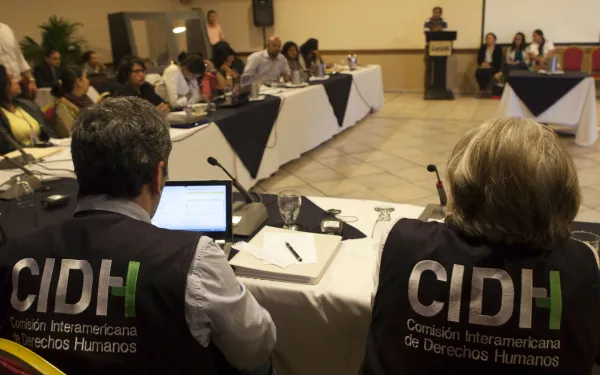
Statement of AIDA, APRODEH and Justiça Global on the financial crisis affecting the Inter-American Commission on Human Rights (IACHR)
The organizations decry the affront to human rights in the region and urges members of the Organization of American States to fulfill their responsibility to adequately fund the Commission. Washington, DC, USA. The Inter-American Commission on Human Rights (IACHR) announced yesterday that a grave financial crisis has led to the suspension of site visits, the cancellation of hearings, and the imminent loss of 40 percent of its staff. The Commission is an autonomous organ of the Organization of American States (OAS). Its mandate is to promote the protection of human rights on the American continent. Together with the Inter-American Court on Human Rights, it forms the Inter-American System for the Protection of Human Rights, which is often the last hope for people and communities whose human rights have been violated and who have failed to find justice in their own country. The Commission called upon OAS Member States to provide funds promised for its operation, and to adopt “a historic and far-reaching decision, one that reflects the States’ commitment to the defense of human rights in the region” at the General Assembly in June. In response to this urgent situation, the Interamerican Association for Environmental Defense (AIDA), the Asociación Pro Derechos Humanos (APRODEH) from Peru and Justiça Global from Brazil, stated: “The imminent loss of nearly half the Commission’s staff is a serious threat to human rights in the region and reflects the lack of political will of Member States to support the Inter-American Commission’s mandate. “Thousands of victims of human rights violations in the hemisphere have placed their trust and their last hopes for justice in the Commission. This is the case for people poisoned by heavy metals in La Oroya, Peru, as well as for communities that have lost their way of life due to the Belo Monte Dam in Brazil. Both groups have cases long pending before the Commission, and bravely continue to seek justice for the violation of their rights. “By not properly financing an organization that they themselves created, the States are establishing another obstacle for these people in their search for justice. “We call on Member States of the OAS to make a voluntary emergency contribution that will allow the Commission to keep its staff, make its planned visits, and undertake the hearings planned for July and October. “The States of the region have a responsibility to the Inter-American System. It is our hope that they honor it, not through speeches and resolutions filled with good intentions, but with concrete actions and immediate financing.”
Read more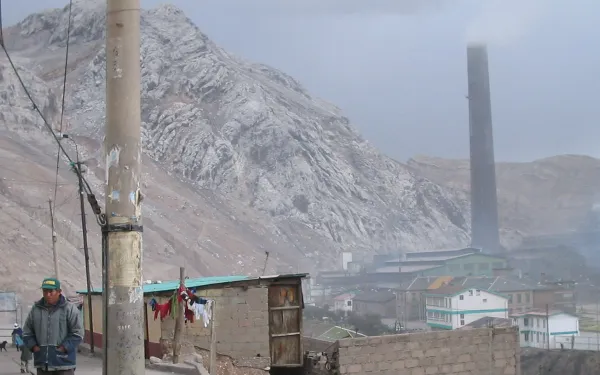
IACHR urges Peru to protect 14 additional people affected by pollution in La Oroya
The Commission did so by extending the precautionary measures originally granted in 2007. The decision arrives six years after it was requested, and confirms the severity of health deterioration in La Oroya. It also confirms that the life and integrity of affected people are at risk, and require urgent and adequate protection by the Peruvian State. Washington DC, USA. The Inter-American Commission on Human Rights (IACHR) urged the Peruvian government to protect the life and integrity of 14 additional people affected by toxic pollution in the city of La Oroya. They join the 65 people already protected by precautionary measures granted by the international body in 2007. The decision reaffirms that the health of the beneficiaries has deteriorated severely, they continue to be at risk, and their government must provide prompt and adequate care. The Interamerican Association of Environmental Defense (AIDA)—together with the Asociación Pro Derechos Humanos (APRODEH), the Centro de Derechos Humanos y Ambiente (CEDHA) and Earthjustice—represents the victims who benefit from the precautionary measures before the Commission. We express our satisfaction with the Commission’s decision, which arrives six years after it was originally requested. A metal smelter operated by Doe Run Peru is the source of the heavy metal contamination in La Oroya. The Commission has established that the lack of integral and specialized medical care, as well as health deterioration over time, could affect the right to life and integrity of the beneficiaries of the precautionary measures, which now number 79. “The extension of the precautionary measures reaffirms the urgent and serious situation threatening the life and integrity of the people of La Oroya. We hope the State fully complies with the provisions in favor of all of the beneficiaries, providing them with adequate and specialized medical attention,” said María José Veramendi Villa, AIDA attorney. The Commission’s decision states that the government of Peru must conduct the medical evaluations necessary to determine the levels of lead, cadmium and arsenic in the blood of affected people, in order to provide them with appropriate medical care, in accordance with international standards. The government must also report on the actions taken to investigate the facts that led to the extension of the precautionary measures, in order to avoid their repetition. Our case on the human rights violations committed against the affected people remains pending the final decision of the Commission. AIDA and APRODEH expect that the report will hold the Peruvian government responsible for said violations.
Read more